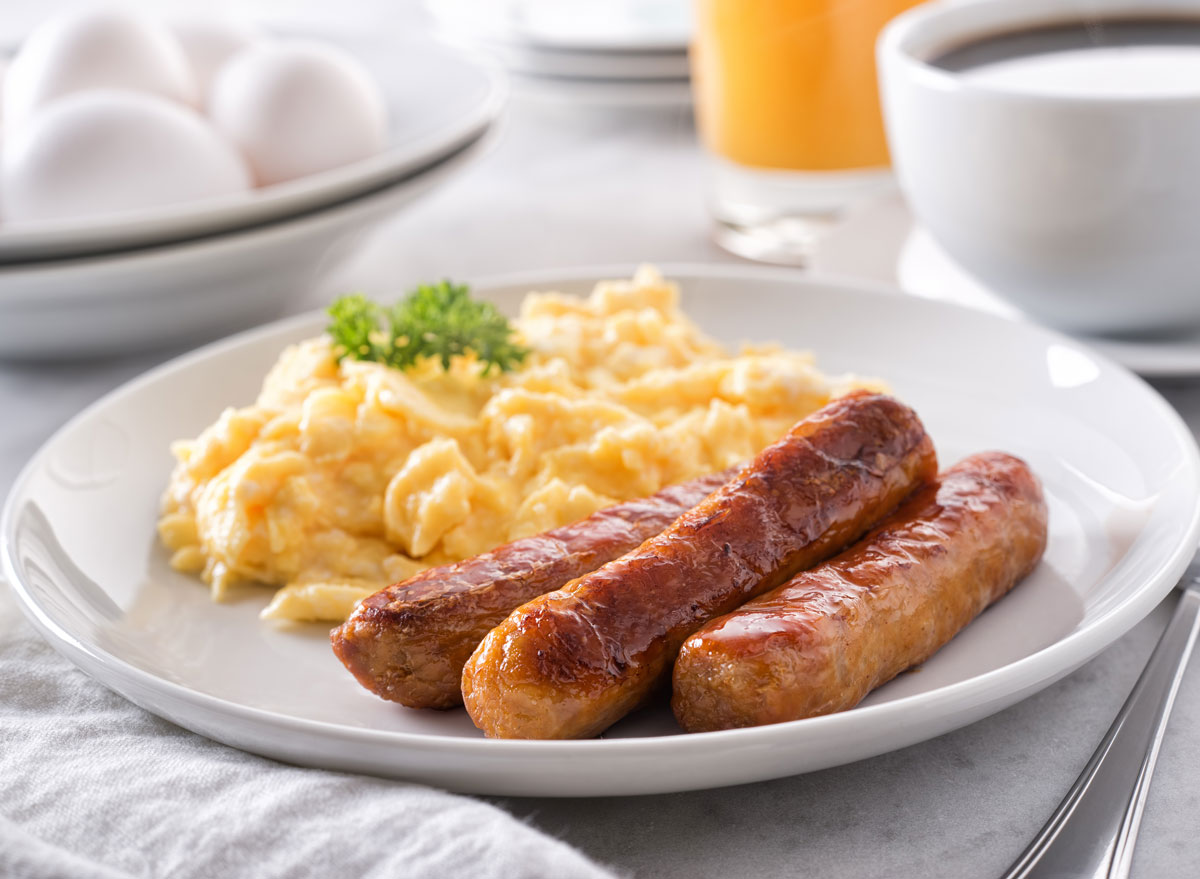The product recommendations in this post are recommendations by the writer and/or expert(s)
interviewed and do not contain affiliate links. Meaning: If you use these links to buy
something, we will not earn a commission.
A typical American breakfast spread of eggs, sausage, and toast may not put a picture of health in your mind, but it can be a part of an overall healthy diet. Breakfast sausage can be a great way to add protein to the first meal of the day while also leaving you satisfied because, come on, who doesn’t love the savory taste of sausage?
But, dietitians agree that the type of sausage you eat matters. You can—and should—swap the high sodium, high fat, and additive-filled breakfast sausage for ones that are good sources of protein and have lower amounts of fat and sodium, making it easier to stay within the recommended limit of these nutrients.
How to choose the best breakfast sausage
Traditionally, breakfast sausage can be loaded with additives, sodium, and plenty of saturated fat. But, there are plenty of brands out there that taste amazing and easily fit into an overall healthy diet. Dietitians want you to look for these things when choosing breakfast sausage:
- Choose lower sodium. Processed meat can be incredibly high in sodium, a nutrient that can increase your risk of developing high blood pressure, a major risk factor for heart disease and stroke. Ideally, choose sausage with less than 10-15% of the daily value (DV) for sodium preserving.
- Watch the saturated fat. Typically red meat, including pork which sausage is often made from, is higher in saturated fat than chicken or turkey. Diets high in saturated fat increase the risk of developing heart disease, so limiting the amount found in your breakfast sausage is a good idea. You should be getting less than 10% of your calories each day from saturated fat, which is about 22 grams per day on a 2,000-calorie diet.
- Aim for protein. Breakfast is notoriously short on protein for many people, and including breakfast sausage can be a great way to meet your protein goals. While all breakfast sausage will have some protein, choosing ones with around 10 grams per serving can help you start your day with a protein-rich breakfast.
For a healthier breakfast sausage, we asked registered dietitians for the brands they recommend that fit this criteria as well as the options you should steer clear of the next time you go to the grocery store. Read on, and for more, don’t miss The Unhealthiest Pancakes at 10 Major Breakfast Chains—Ranked!
Best healthy breakfast sausage brands
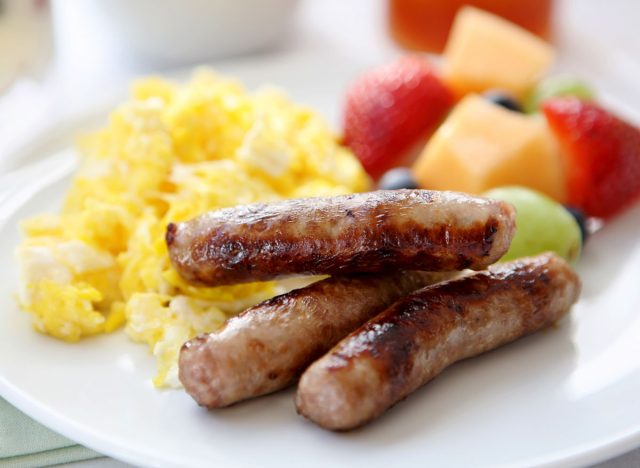

Registered dietitians love these six brands for healthy breakfast sausages.
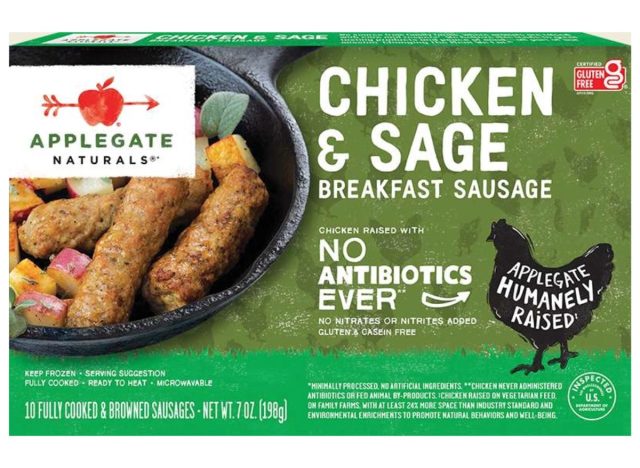

Per 3 links (59g): 110 calories, 8 g fat (2 g saturated fat), 390 mg sodium, 1 g carbs ( 0 g fiber, 0 g sugar), 9 g protein
Instead of choosing pork sausage that’s generally higher in saturated fat, Applegate Chicken and Sage Breakfast Sausage has only 2 grams per serving of 3 links, which is just 9% of the recommended daily limit. You can enjoy this sausage with many breakfast dishes for a satisfying and healthier breakfast option, says Steph Magill, MS, RD, CD, FAND.
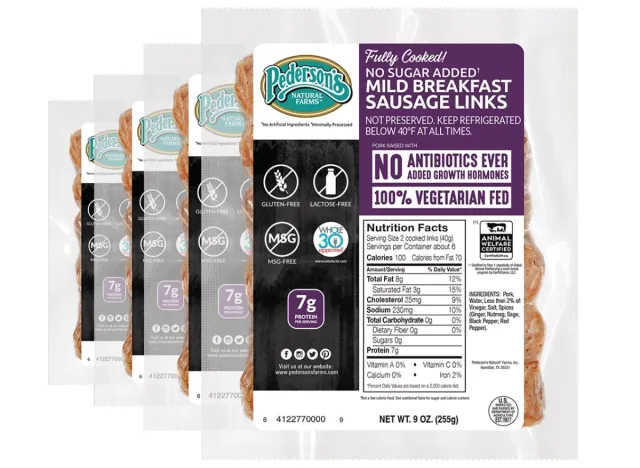

Per 2 cooked links (40 g): 100 calories, 8 g fat (3 g saturated fat), 230 mg sodium, 0 g carbs (0 0 g fiber, 0 g sugar), 7 g protein
“Pederson’s Natural Farms breakfast sausage is a healthy option for those concerned about the ingredients and quality of their breakfast sausage,” says Lara Clevenger MSH, RDN, CPT. Each serving of two links has just 100 calories, 3 grams of saturated fat, and 230 milligrams of sodium, or 10% of the recommended DV. “Not only is it raised without antibiotics or growth hormones, but it also contains no preservatives, no artificial ingredients, and is gluten-free,” Clevenger adds.
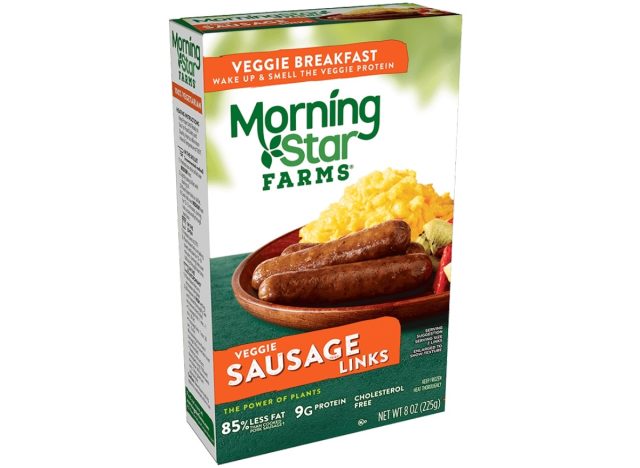

Per 2 links (45g): 70 calories, 3 g fat (0 g saturated fat), 300 mg sodium, 3 g carbs (1 g fiber, 0 g sugar), 9 g protein
For a vegetarian sausage option, Morning Star Farms Original Veggie Sausage Links are a great, saturated-fat-free option with just 300 milligrams or 13% of your DV for sodium. These meat-free sausage links also have 10% of the DV for iron and are an excellent source of several B vitamins.
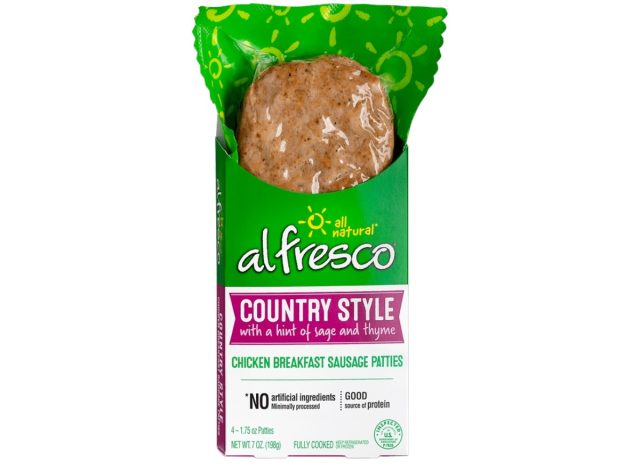

Per 1 patty (50g): 80 calories, 4.5 g fat (1.5 g saturated fat), 280 mg sodium,1 g carbs (0 g fiber, 0 g sugar),9 g protein
“For those looking to savor the comforting flavors of a southern sausage biscuit while maintaining a pork-free lifestyle, Al Fresco’s Country Style Chicken Breakfast Patty is a healthful and delicious choice,” says Jessie Hulsey RD, LD, an Atlanta-based registered dietitian. “Each patty has only 80 calories, 1,5 grams of saturated fat, and just 280 milligrams, or 12% of the recommended daily limit of sodium. These breakfast patties are great for use in sandwiches with an egg, tomato, and English muffin, or for dicing up and baking into a frittata.”
READ RELATED: Weight Loss And Sleep: How Poor Sleep Can Hinder Your Weight Loss Process?
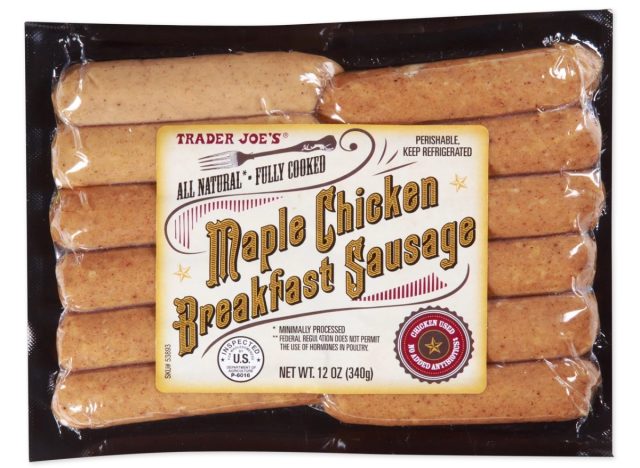

Per 2 links (57g): 90 calories, 4 g fat (1 g saturated fat), 430 mg sodium,3 g carbs (0 g fiber, 3 g sugar),10 g protein
For a sweet and savory breakfast sausage, Trader Joe’s Maple Chicken Breakfast Sausage is the perfect choice. Each serving has just 90 calories, 1 gram of saturated fat, and provides 10 grams of protein. “This is a great lean protein option for individuals looking for ways to boost the protein content of their breakfast,” says Mandy Tyler, M.Ed., RD, CSSD, LD. “Spreading protein consumption throughout the day is recommended to support optimal muscle protein repair and growth,” Tyler adds.
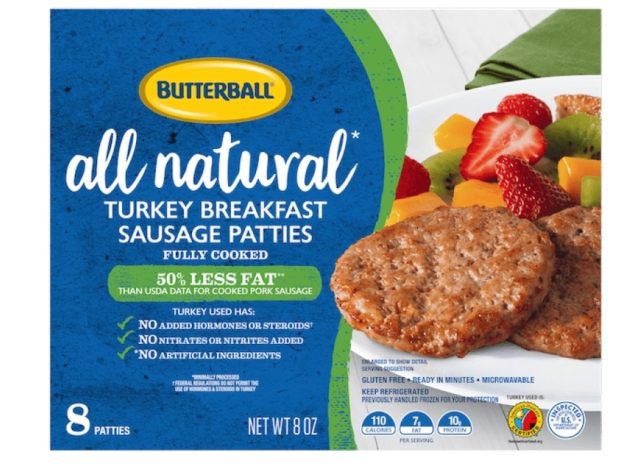

Per 2 patties (57g): 110 calories, 7 g fat (2 g saturated fat), 420 mg sodium, 0 g carbs (0 g fiber, 0 g sugar), 10 g protein
These Butterball Turkey Breakfast Sausage Patties have only 2 grams of saturated fat per serving of 2 patties, less than 10% of the recommended daily limit. They’re fully cooked and minimally processed, containing just turkey and a small amount of sugar, spices, vinegar, and citric acid for preservation.
Worst breakfast sausage brands
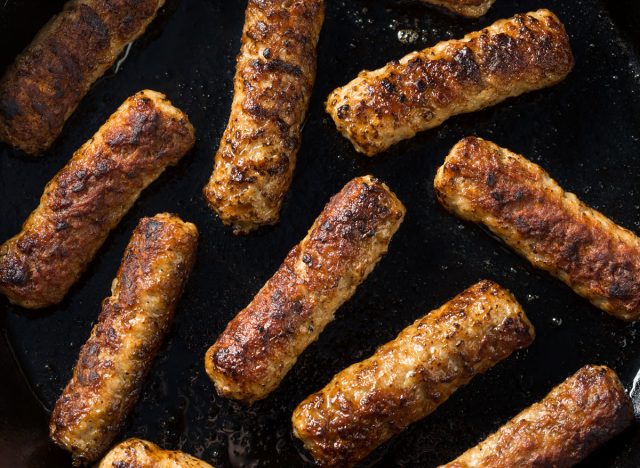

Dietitians agree that these breakfast sausage brands don’t make the cut as a regular choice for a healthy diet.
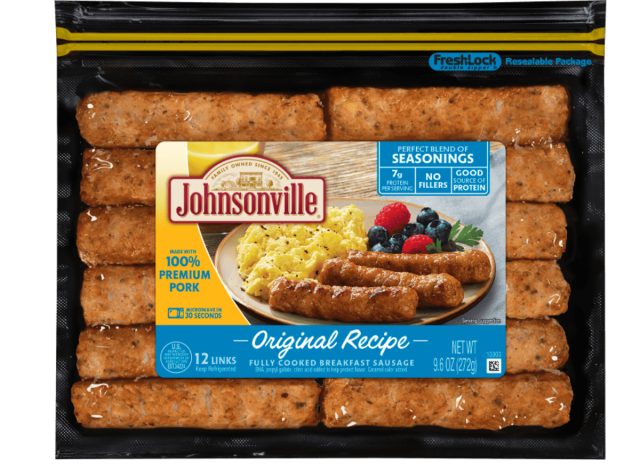

Per 3 skillet cooked links (55g): 170 calories, 13 g fat (4.5 g saturated fat), 490 mg sodium, 2 g carbs ( 0 g fiber, 1 g sugar), 10 g protein
Johnsonville Original Recipe Breakfast Sausage is unhealthy for its high amount of saturated fat and sodium, says Wan Na Chun, MPH, RD, CPT of One Pot Wellness. Each serving has 20% of the daily value for saturated fat, making it a high saturated fat food. It also has 21% of the DV for sodium, making it high in sodium as well. Both of these nutrients are linked to an increased risk of heart disease, so it’s important to eat them in moderation, adds Chun.
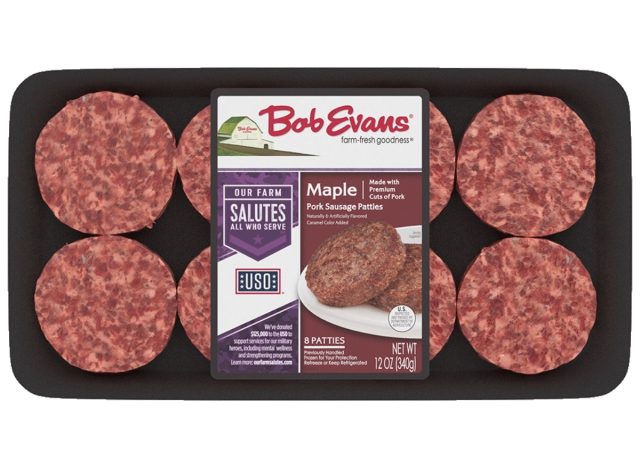

Per 2 patties (59g): 200 calories,15 g fat (6 g saturated fat), 430 mg sodium,3 g carbs (0 g fiber, 2 g sugar), 12 g protein
Just two Bob Evans Maple Pork Sausage Patties will give you 27% of the amount of saturated fat you should have in an entire day. They also have 2 grams of added sugars (which give them the maple flavor), and 19% of your DV for sodium.
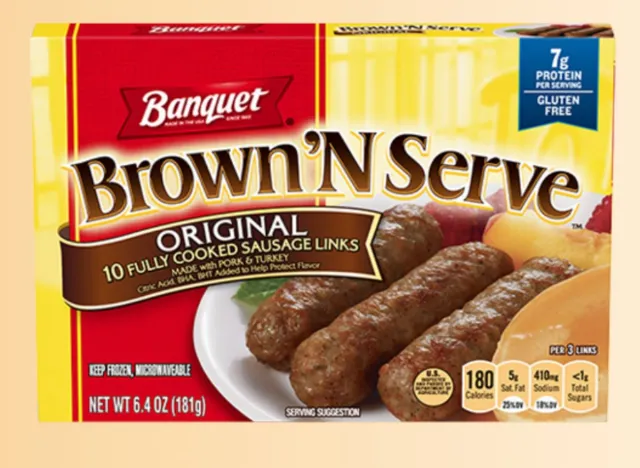

Per 3 links (54g): 180 calories,16 g fat (5 g saturated fat), 410 mg sodium, 2 g carbs (0 g fiber, <1 g sugar), 7 g protein
These Banquet Brown ‘n Serve Original Sausage Links are made with pork and turkey, but still clock in with 5 grams, or 23% of the DV, of saturated fat. This sausage also includes the preservatives BHA and BHT, both of which are FDA-regulated food additives and found to be safe in small amounts, but have some evidence of causing thyroid damage, cancer, and neurotoxicity when exposed to large amounts.
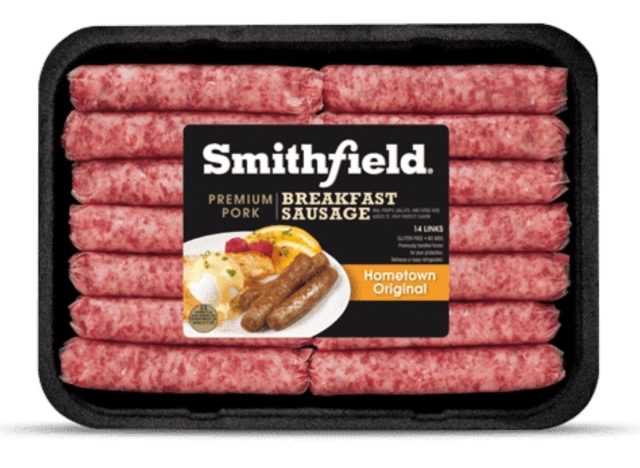

Per 3 cooked links (55g): 190 calories, 15 g fat (5 g saturated fat), 440 mg sodium, 2 g carbs (0 g fiber,1 g sugar), 10 g protein
While these Smithfield Hometown Original Breakfast Sausage Links advertise as gluten-free and MSG-free, they will add 5 grams, or 23% of the recommended daily limit of saturated fat to your breakfast along with 19% of your sodium limit. And while they are MSG-free, they still include preservatives like propyl gallate, BHA, and potassium lactate.

